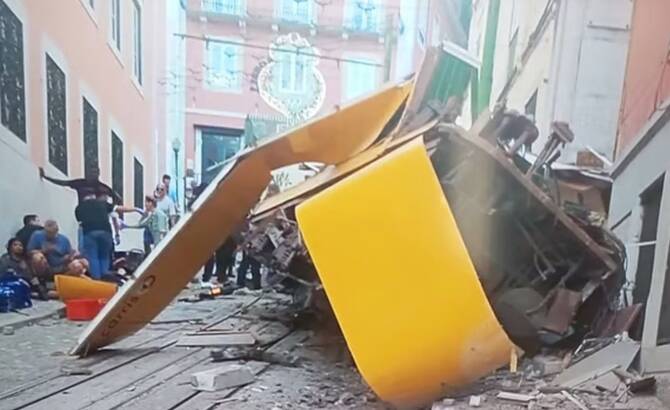
Portuguese police have confirmed that three Britons were among the 16 people killed in Lisbon on Wednesday evening when one of the city’s funicular streetcars derailed and hurtled down a hill and into a building.
The accident, described by Portugal’s prime minister, Luís Montenegro, as “one of the biggest tragedies in our recent history”, also left 21 people injured, five of whom are in a serious condition.
A preliminary report on the crash on the Elevador da Glória is due to be released on Friday by the government’s office for air and rail accident investigations.
In a statement on Friday morning, police said the accident had killed five Portuguese citizens, three Britons, two South Koreans, two Canadians, one American, one Ukrainian, one Swiss citizen and one French person.
Police said that a German citizen thought to have died in the crash had been located alive in a hospital. Local media had reported that a German father had died and a mother was seriously hurt while their 3-year-old child suffered minor injuries.
The German foreign ministry said at least three German nationals were in hospital.
The injured also include Spanish, Israeli, Portuguese, Brazilian, Italian and French citizens, according to the executive director of Portugal’s national health service, Álvaro Santos Almeida.
Downing Street said Keir Starmer was deeply saddened to hear of the death of the three Britons.
A No 10 spokesperson said: “The prime minister is deeply saddened to hear that three British nationals have died in the funicular crash in Lisbon. His thoughts are with their families and those affected by this terrible incident. We stand united with Portugal during this difficult time.”
The wreckage of the Elevador da Glória vehicle was removed from the scene on Thursday night and taken by police for examination as a day of national mourning ended. The chief police investigator, Nelson Oliveira, said a preliminary police report, which would have a broader scope, was expected within 45 days.
Investigators have not found any evidence of sabotage, leaving mechanical failures or maintenance issues among the possible causes.
The Glória line carries about 3 million people, tourists and residents annually. Its two cars, each capable of carrying about 40 people, are attached to opposite ends of a haulage cable, with traction provided by electric motors on the cars.
On Thursday, the leader of the Fectrans union, Manuel Leal, told a local television station that workers had complained that problems with the tension of the cable that hauls the carriages had made braking difficult, but added it was too early to say if that had caused the crash.
Carris, the municipal public transport company that operates the service, said “all maintenance protocols” had been carried out, including monthly and weekly service programmes and daily inspections.
The president of Carris, Pedro de Brito Bogas, said the streetcar, which had been in service since 1914, underwent a scheduled full-maintenance programme last year and the company conducted a 30-minute visual inspection of it every day.
At a news conference, he said the streetcar had last been inspected nine hours before the derailment, but did not detail the visual inspection, nor specify when questioned whether all the cables had been tested.
Hundreds of people, including the prime minister, Portugal’s president, Marcelo Rebelo de Sousa, and Lisbon’s mayor, Carlos Moedas, attended a solemn mass at Lisbon’s church of Saint Dominic on Thursday evening.
On Thursday afternoon, the prime minister called the crash a “tragic accident that transcends borders and a pain that knows no nationality”, and promised a quick investigation to establish what had gone wrong.
“The competent authorities will swiftly carry out the necessary investigations to determine the cause of this tragic accident,” he said. “We will determine all responsibilities with a sense of respect for all those who suffered and are suffering the effects of this accident.”
Moedas said there were no words to describe the pain the city was feeling. “We’re gathering all the information to determine who is responsible. The city needs answers,” said Lisbon’s mayor. (Guardian)
